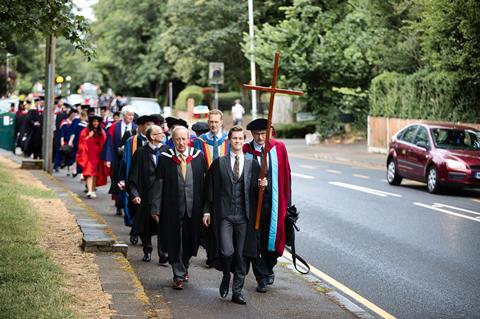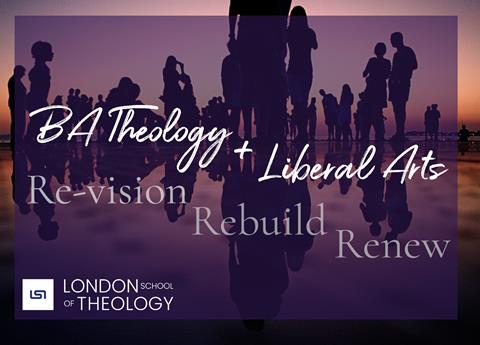Advertisement feature

As some tell the story, theology has lost its place in the spotlight of higher education. Theology, once considered the Queen of the Sciences, appears to have fallen out of favour in secular universities. Theology and religious studies departments everywhere are shrinking, with some being absorbed into philosophy, history, or sociology departments. Elsewhere, theological colleges are closing their doors or combining with other colleges to keep the lights on. This story, as told, seems rather bleak.
The apparent decline of theology in the higher education sector seems to match a similar decline in church attendance. Churches everywhere are closing their doors, leading many to rethink the meaning church altogether and the ways we gather, as we explore what worship looks like in a digital age. There is a possible parallel between the Christian experience of higher education and church decline; perhaps it is also time to rethink how we do theological education.
Does Theology Belong in the Academy?
This is the question theological educators often find themselves wondering in light of the apparent decline: do we belong in higher education anymore? Or has higher education become so secular that it only has room for things like the sociological and philosophical study of religion? As theological programmes are shrinking, theology departments at large universities often find themselves folded into other departments. Theologians are increasingly finding themselves in combined departments with philosophy, liberal arts, education, history or sociology. And many have begun to worry that this signals the end of theology in higher education as these other disciplines eclipse what it is we do.
Is the move towards combining with other departments just a subtle way of pushing theology slowly out of the Academy through a slow takeover of the study of Christian religion by other departments?
Perhaps. Or perhaps not. We may not be able to speak to the intentions of higher education institutions when they opt for these sorts of moves, but we can respond to this shifting educational landscape. While it does seem that the combining of theology with other departments has led to shrinking theology departments, that could also be a result of theological educators resisting the change rather than responding to it. The ways that theologians who find themselves in such situations seek to define themselves from what their colleagues do, clearly defending how theology is not philosophy or sociology or history, while helpful for the world of Christian theology might have negative effects on how we fare when it comes to decisions like hiring new faculty or allocating teaching resources. We need theology to fit in among other disciplines in order to stay in the universities, but we resist engaging with other disciplines for fear of being eclipsed by them.
However, we tell this story of the decline of theological education, one thing is clear: theological education will not continue to thrive in today’s environment unless it learns to play well with others. So rather than resisting engagement with other disciplines, why not lean in? Why not embrace the interesting ways that theology can learn from and contribute to conversation with other disciplines. Theology is, after all, interdisciplinary by nature. To study the Bible, we need to understand languages, history, and the classics. To think systematically about the nature of doctrines like atonement or justification, we must use tools of reason and analysis borrowed from philosophy. To draw on the great thinkers of the Christian Tradition, we must, again understand history. And to address issues facing the Church today, we must often engage sociology to understand the society in which we live. Theology is already interdisciplinary, so why not embrace that interdisciplinarity as a new kind of belonging in the Academy.
![LST Library[47]](https://d17xjl6rg4e8ic.cloudfront.net/Pictures/480xany/0/8/4/41084_lstlibrary47_858543.jpg)
Conversations: Looking to the Future of Theological Education
What might this new way of relating to other disciplines in this way look like and what sort of a future can it promise the next generation of theological educators and students? Theological education that belongs among the disciplines does not have to compromise on what it does or on its values. Theology can stay—for lack of a better term—theological while learning from what other disciplines have to offer.
Theology can have its own goals, for instance, of explaining the human creature as made in God’s image while still seeking advice from biologists on how the human bodies that image God actually work. Theologians exploring the doctrine of Scripture can learn from scholars of literature about the shape of a story or the construction of characters in order to better understand the heroes and villains of the Bible better.
This mode of belonging in the Academy, of belonging among the other disciplines of higher education, treats engagement with other disciplines like philosophy and sociology not as competition, but as conversation. Rather than trying to defend an independent and isolated place for ourselves in the halls of higher education, theologians can think of ourselves as members of a much broader community, engaging in conversation with philosophers, sociologists, and historians instead of trying to compete with them for academic space. This affords opportunities to both learn from other disciplines—often disciplines theology has already learned from historically—and to contribute to those other disciplines as a conversation partner.
The disposition of conversation partner promises a more hopeful future for theology among the other disciplines. When we take this approach, we no longer see our discipline as a waning practice fading into obscurity, but as a newly enriched and renewed exploration of who God is and why this matters. We, too, are no longer opposed to conversing with the other disciplines, because this approach no longer seeks to seat Christian theology on the throne above other disciplines; they are conversation partners from whom we may learn and who can learn from us. If we truly believe that the Academy is a better, brighter place with theology in it, then we need to move from outdated models of rulership and authority towards a model of our belonging among the disciplines.

Theology and Liberal Arts at the London School of Theology*
The BA Theology and Liberal Arts at London School of Theology is a new programme* which provides a broad theological education that integrates theology with philosophy, the arts, and the sciences. The programme aims to resource Christian disciples for active citizenship through compassion, mission, and social justice.
*Subject to validation by Middlesex University, this programme will commence in Autumn 2025.
For more information about this programme, visit: www.lst.ac.uk/theology-liberal-arts
Dr Andy Everhart, Lecturer in Theology and Programme Leader BA Theology and Liberal Arts, London School of Theology

























